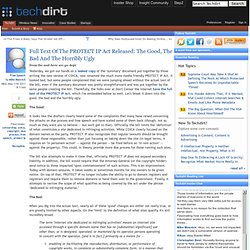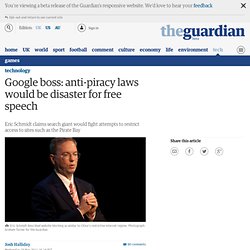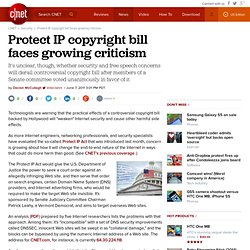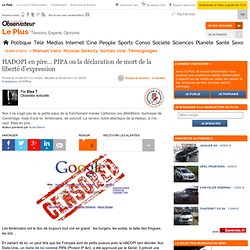

Full Text Of The PROTECT IP Act Released: The Good, The Bad And The Horribly Ugly. Yesterday, we got our hands on a leaked copy of the "summary" document put together by those writing the new version of COICA, now renamed the much more media friendly PROTECT IP Act.

It looked bad, but some people complained that we were jumping ahead without the actual text of the bill, even if the summary document was pretty straightforward and was put together by the same people creating the bill. Thankfully, the folks over at Don't Censor the Internet have the full text of the PROTECT IP Act, which I've embedded below as well. Let's break it down into the good, the bad and the horribly ugly. The Good: It looks like the drafters clearly heard some of the complaints that many have raised concerning the attacks on due process and free speech and have scaled some of them back (though, not as much as they want you to believe -- but we'll get to that). Google boss: anti-piracy laws would be disaster for free speech.
Google's executive chairman, Eric Schmidt, warned on Wednesday that government plans to block access to illicit filesharing websites could set a "disastrous precedent" for freedom of speech.

Speaking to journalists after his keynote speech at Google's Big Tent conference in London, Schmidt said the online search giant would challenge attempts to restrict access to the Pirate Bay and other so-called "cyberlocker" sites that encourage illegal downloading – part of government plans to fight online piracy through controversial measures included in the Digital Economy Act. "If there is a law that requires DNSs [domain name systems, the protocol that allows users to connect to websites] to do X and it's passed by both houses of congress and signed by the president of the United States and we disagree with it then we would still fight it," he added. "If it's a request the answer is we wouldn't do it, if it's a discussion we wouldn't do it. " "It doesn't seem right. Protect IP copyright bill faces growing criticism. Technologists are warning that the practical effects of a controversial copyright bill backed by Hollywood will "weaken" Internet security and cause other harmful side effects.

As more Internet engineers, networking professionals, and security specialists have evaluated the so-called Protect IP Act that was introduced last month, concern is growing about how it will change the end-to-end nature of the Internet in ways that could do more harm than good. (See CNET's previous coverage .) The Protect IP Act would give the U.S. Department of Justice the power to seek a court order against an allegedly infringing Web site, and then serve that order on search engines, certain Domain Name System (DNS) providers, and Internet advertising firms, who would be required to make the target Web site invisible.
It's sponsored by Senate Judiciary Committee Chairman Patrick Leahy, a Vermont Democrat, and aims to target overseas Web sites. Sen. HADOPI en pire… PIPA ou la déclaration de mort de la liberté d’expression. Les Américains ont le don de toujours tout voir en grand : les burgers, les sodas, la taille des fringues, les lois… En parlant de loi, on peut dire que les Français sont de petits joueurs avec la HADOPI tant décriée.

Aux Etats-Unis, un texte de loi nommé PIPA (Protect IP Act), a été approuvé par le Sénat. Il prévoit une farouche répression , donnant aux fonctionnaires fédéraux de chaque état des pouvoirs que l’on pourrait voir comme une sorte de Gestapo du web. Le désir des Etats-Unis de tout garder sous contrôle est décidément tenace. Et cette loi va très loin. Explications : Si on vous interdit d’aller sur un site proposant du contenu illégal, ou piraté, appelez ça comme vous voulez, il y a de grandes chances que cela ne suffise pas à vous en dissuader. Les Etats-Unis ont décidé de prendre le mal à la racine. Google, Bing, Yahoo, et tous les moteurs de recherche sortant du trio de tête se feront taper sur les doigts s’ils référencent un site interdit.